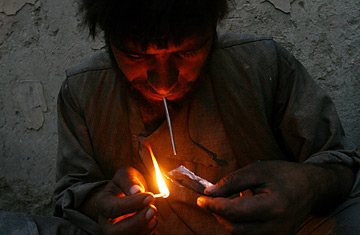
A man smokes opium in the old city of Kabul, Afghanistan.
But in growing numbers, Afghans are succumbing to the dangers of their nation's largest cash crop. "Cultivation overshadows everything here, but for Afghans, drug abuse has also become a big problem," says Elizabeth Bayer, formerly of the U.N. Office on Drugs and Crime (UNODC) in Afghanistan.
Over the past several years there has been a significant increase in the number of drug users throughout the country. Afghanistan's Public Health minister, Amin Fatimie, says heroin addicts in the capital city, Kabul, have doubled to 14,000 since 2003. According to the first ever nationwide survey on drug use in Afghanistan by the UNODC, there are nearly 50,000 heroin users in the country as a whole, and an additional 150,000 who use opium. "For those in the West, that may not look like a lot," says Fatimie. "But for me it's a big number. It's a warning."
The large influx of refugees returning from camps in Pakistan and from Iran, where per capita heroin use is the highest in the world, saw addiction rates skyrocket in the first few years after the fall of the Taliban. But even as the number of returnees dwindles, addiction rates continue to rise. The UNODC survey estimates that nearly 4% of Afghan adults use some kind of drug. "This goes beyond returnees," says Bayer. "The results have gone beyond expectations; no one expected use to be so high." Bayer says she has visited villages in the north of Afghanistan where the entire population is addicted to opium. Mothers in carpet weaving districts take opium to ease muscle aches earned from spending long days at the loom, and give it to their children to keep them quiet. Says Bayer: "There is no education, no awareness of the harm that opium causes. People here have been traumatized. If they can find something to relieve the pain, they will take it."
For the first time, sophisticated refineries are now operating in Afghanistan, making heroin increasingly easy to find — and cheap. Dr. Tariq Suliman, director of Nejat Center, one of only three rehabilitation facilities in the capital, worries about the prevalence of high-grade "crystal" heroin now on the market. "Before, you could only get brown sugar" he says, referring to unrefined heroin that needs to be dissolved in lemon juice, rather than water, in order to be injected. "Now I see patients using crystal. It's not as hard on the body, but it is much more addictive."
With a resurgent Taliban in the south, famine and widespread poverty, drug addiction may rank lowest on the long list of Afghanistan's problems. But it is accompanied by an equally disturbing increase in AIDS cases. Fatimie estimates that half of Afghanistan's 2,000 suspected and 61 confirmed cases of AIDS have been transmitted by intravenous drug use. That doesn't surprise Suliman, who says up to 10 users will share the same needle. Nejat Center and a few foreign NGOs have started distributing condoms and single-use syringes wherever drug users congregate, but that's only a short-term solution, according to Suliman. "We are on the frontlines of the addiction war, and we are losing." The Nejat center does not advertise its services. With only 10 beds (there are less than 200 beds devoted to drug rehab in the whole country), Suliman knows he wouldn't be able to handle the demand. And even for those he does treat, the success rate is 20% to 35%. With little funding and no access to substitution drugs, such as methadone, treatment is rudimentary.
Bagh Ali Mardan, a 27-year-old addict from Bamiyan, has tried to quit several times. Now he has given up. Waving a couple of curious children away from the ruins of a bombed house in Kabul where junkies congregate, he says it's better to stop the next generation from getting the habit. "This is a big problem for Afghanistan, much worse than terrorism or the Taliban. In war, if the enemy kills you, you die once. But addiction kills the future."
